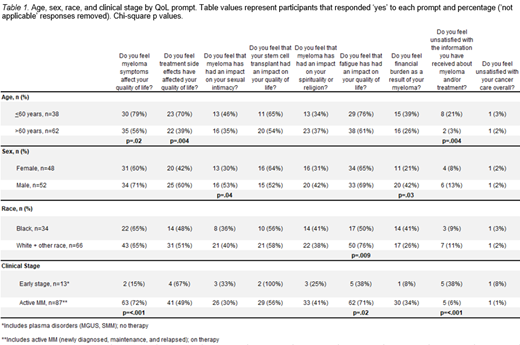Abstract
Introduction. Multiple myeloma (MM) patients suffer from disease symptoms and impact on quality of life (QoL) - a patient's sense of enjoyment, well-being, and ability to carry out activities of daily living. Reports on QoL in MM have focused on clinical trials that usually involve younger patients with adequate performance status (PS), mostly Caucasians. The median age of MM onset is 69 years; advanced age is associated with multiple comorbidities and deteriorating PS. Blacks have twice the incidence of MM compared to Caucasians; they also have a higher risk of dying due to poor healthcare utilization. Here, we explored the multifactorial nature of race, sex, age, and clinical stage in patient reported QoL outcomes using quantitative cross-sectional analyses from a single center in urban setting.
Methods. Participants with a diagnosis of plasma cell disorders at various stages: MGUS, smoldering myeloma (SMM), or MM (newly diagnosed, maintenance, relapsed/refractory) were sequentially enrolled for a one-time measurement of QOL outcomes. Consent and study questionnaire were conducted verbally. Participants simply responded 'yes' or 'no' to nine question prompts outlined in Table 1, followed by verbal reasoning which was transcribed by the interviewer. The questionnaire included three main domains of QoL assessment based on existing literature review and feedback with our patient population. The first is physical symptoms and function (disease-related symptoms, treatment-related adverse events, sexual health and satisfaction with care), the second is mental health (depression, spirituality), and the third is social impact (financial burden, family support). Data were analyzed using chi-square test of independence. Participants will be re-approached for a second interview to determine changes to impact across the same QoL variables over time. The questionnaires validated within the current study will be used for a longitudinal cohort study to investigate whether a greater degradation is observed in one or more QoL domains during a specific time-point of MM disease course.
Results. A total of 100 patients (males n=52) were enrolled. Median age was 64 years (IQR 55 - 68); 59 were Caucasian, 34 were Black, and 7 from other racial groups. At the time of interview: 7 were newly diagnosed or receiving induction therapy, 25 were undergoing stem cell transplant (SCT), 22 were on maintenance therapy, 33 were relapsed on salvage therapy, and 13 on no therapy (MGUS/SMM). Regardless of race, age, or sex, patients on therapy felt their QOL was impacted by fatigue (67%), and myeloma symptoms (65%). Black participants reported more fatigue as an impact on their QoL compared to other racial groups, p = .009. Women reported more impact from MM on sexual intimacy, p = .04, and impact from financial burden than male participants, p = .03. Younger patients <60 years old (n=38) reported more impact from treatment-related adverse events, p = .004, disease-related symptoms, p = .02, and dissatisfaction with information received about their disease and/or treatment, p = .004, compared to patients aged >60 years. Not surprisingly, patients with active MM (n=87); newly diagnosed on therapy, those undergoing SCT, or on maintenance, and relapsed disease) reported more MM symptoms p = <.001, and suffered from more fatigue, p = <.02, with higher impact on QoL compared to those with early-stage plasma cell disorders (MGUS, SMM). However, early-stage patients felt more dissatisfaction with information received and uncertainty about what to expect, p = <.001, compared to MM patients receiving therapy. Interestingly, there were no age, sex, race, or clinical stage dependent effects observed from SCT experience, spirituality or religion, and dissatisfaction with cancer care.
Conclusions. Patients <60 years were impacted more by disease-related symptoms, treatment-related adverse events, in comparison to patients >60 years. Women felt their QoL was impacted by MM's affect on sexual intimacy and resulting financial burden in comparison to men. Black participants felt greater impact from fatigue in comparison to Caucasian and other races. Active MM patients on treatment were more impacted by disease-related symptoms and fatigue compared to early-stage patients. MGUS/SMM patients not on therapy were more impacted by dissatisfaction of information received compared to patients receiving treatment at time of data collection.
Badros: Janssen: Research Funding; J&J: Research Funding; BMS: Research Funding; GlaxoSmithKline: Research Funding.


This feature is available to Subscribers Only
Sign In or Create an Account Close Modal